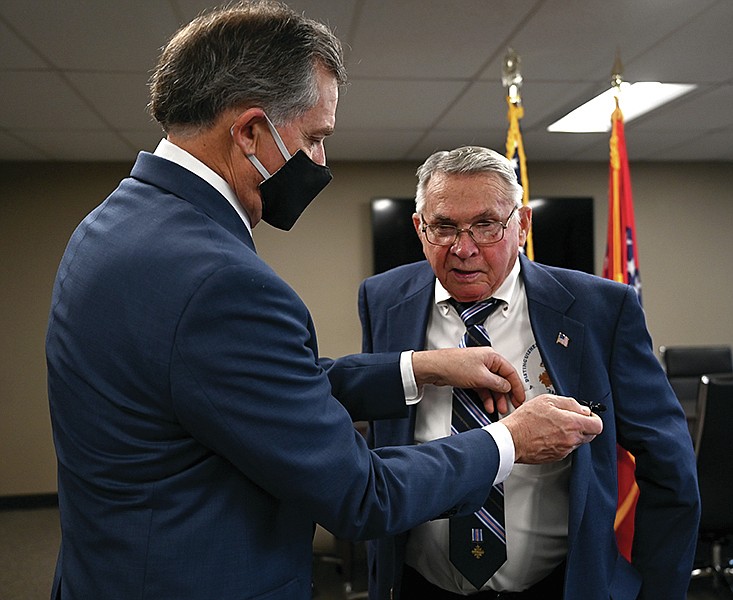Retired Air Force Master Sgt. Bob Davis remembers practically every mission in his 22-year military career.
He remembers flying combat missions over Vietnam. He remembers the test flights for one of the Air Force's most iconic gunships. But it wasn't until May that Davis remembered he was missing two medals from his service during the Vietnam War.
The missing medals were likely because of a clerical error.
On Tuesday, Davis, 84, was finally awarded the medals for his service 45 years after leaving the Air Force. U.S. Rep. French Hill, R-Ark., presented him with two Vietnam War-era medals in an informal ceremony in Little Rock.
"It's about five decades late, but we're proud to do it," Hill said.
Davis flew 67 combat missions during the Vietnam War. He was missing two key distinctions for his service during that war: the Vietnam Service Medal and the Vietnamese Gallantry Cross.
The Vietnam Service Medal was awarded to U.S. military personnel for service during the Vietnam War. The Gallantry Cross was a decoration issued by the now-defunct government of South Vietnam.
For Davis, who has a detailed memory of his long career in the Air Force, the medals were all but forgotten. It wasn't until he was nominated for the Arkansas Military Veterans Hall of Fame that he realized he should have received those decorations long ago.
So in May, he reached out to Hill's office for help.
The likely cause for the Air Force mix-up had to do with the nature of Davis' service during the Vietnam War, he said. For much of the conflict, Davis was based in Okinawa, Japan, and would be assigned to missions in Vietnam in 16-day intervals.
That meant that Davis' crew was, perhaps, technically based in Okinawa, meaning the military may have not considered him in combat during the war.
The purpose for that classification was to hide the U.S. military's buildup during the war, Davis said.
"Back in that time, you didn't show strength buildup in country," Davis said.
Hill said requests from veterans and their families for service records are common for his office. Some people are looking for medals they earned. Others may need documentation for health benefits or funerals with military honors.
For his service in Vietnam, the Air Force awarded Davis with two Distinguished Flying Crosses for combat missions. The medal is bestowed for heroism or extraordinary achievement.
As a flight engineer in an AC-130, Davis' combat missions were often at night and sometimes drew anti-aircraft fire from North Vietnamese forces.
"Anti-aircraft fire is beautiful, then you realize how d*** dangerous it is," Davis said.
Davis grew up in Hopkinsville, Ky., near the U.S. Army base Fort Campbell. With not many options in his small town, Davis said he joined the Air Force so he "wouldn't have to join the Army."
"The only thing we had was a tattoo parlor on one corner, a saloon on the other and a bank on the other, and that was it," Davis said.
One of the notable missions early in his career was flying paratroopers to Little Rock in 1957 as part of the Eisenhower administration's effort to enforce racial desegregation at Central High School. However, Davis' plane was ordered back to base and never landed in Little Rock.
For much of Davis' service in the Air Force, he flew on an AC-130 gunship. He was part of the crew that conducted some of the original flight and gunnery tests for the groundbreaking military airplane.
Toward the end of his career, Davis was based at Little Rock Air Force Base in Jacksonville. He met his wife, Pat Barnard, after he was discharged. Together they have eight children, 18 grandchildren and 20 great-grandchildren.
Dressed in a blue suit with a tie bearing the Distinguished Flying Cross, Davis on Tuesday downplayed the error that led to his missing medals, saying he was partially at fault for not catching it when he left the Air Force in 1975.
The 45-year wait and months of research to get approval from the Air Force didn't seem to bother him much.
"He doesn't like to be bragged on, you know. He's humble," Barnard said.

